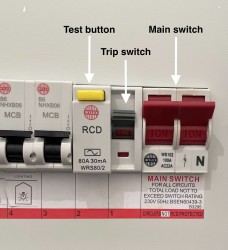What to do in a Power Cut
National power cuts in the UK are rare, but you may experience a local power cut or a power cut in your home due to a faulty fuse box. Read on to find out how you can stay prepared, what help may be available to you, and what to do in a power cut.
Last updated - 21/11/2022
Estimated reading time - 7 minutes
What causes power cuts?
National power cuts in the UK are very rare, but for a number of reasons, local outages sometimes occur. If you experience a power cut, the chances are there is a local outage or, more likely, there is an isolated electrical fault in your property.
Here are some of the most common causes of a power cut:
- Accidents. Accidental damage to cables carrying electricity by contractors or people digging in their garden.
- Acts of nature. Acts of nature such as storms, lightning, flooding, fallen trees, etc. can all cause damage to electrical cables and equipment.
- Theft. Theft of electrical cables or equipment can interrupt the supply of electricity to properties.
- Supply shortages. If the demand for electricity is greater than the available supply and it can’t be distributed to all customers, electricity Distribution Network Operators may carry out emergency power cuts to share the supply of electricity fairly across the UK and to protected sites where power is a necessity.
- An issue with your home’s wiring. An overloaded circuit, faulty wiring, or faulty electrical equipment in your home can trip the switch on your fuse box and cut off power to the circuit boards, resulting in a power cut in your home.
Let us fix your faulty wiring.
At Smart Plan we have thousands of engineers up and down the country who are ready to fix your issue. We guarantee an engineer to your property within 48 hours.
How will I know if there is a power cut in my area?

If there are planned power cuts in your area, your local network operator will contact you to inform you when the outage will be and how long it will last. Your local network operator is the company that manages and maintains the underground cables, overhead power lines, and substations that provide electricity to homes and businesses in your area. Your local network operator may not be able to contact you in the event of an emergency situation.
To get information on power cuts in your area, you can be put straight through to your local network operator by free phoning 105 if you’re in England, Scotland, or Wales. If you’re in Northern Ireland, call 03457 643 643. Alternatively, you can find your local network operator by clicking here
What to do in a power cut
- Check if your neighbours still have power. If your power goes out and your neighbours still have power in their homes, it is likely there is an issue with the fuses or trip switch in your home.
- Check the fuses and trip switch in your home. You may have lost power in your property due to a tripped switch or blown fuses. If there is a fault with your property’s wiring or an electrical appliance, the trip switch will cut off the power to the circuit the fault is on.
Not all properties have a trip switch, if yours does, it will be located near the fuse box. Fuse boxes are usually located in the utility room, garage, hallway, kitchen, or under the stairs.
If the trip switch is off:

- Turn it back on again. If it stays on and you still don’t have electricity, check that the main switch on the fuse box is on.
- If the main switch on the fuse box is off, turn it on. If the trip switch trips again, you have a fault with your wiring, an appliance, or the fuse box.
- With the main switch on the fuse box off, turn the trip switch back on. If it doesn’t stay on, there is a fault with the fuse box or the trip switch itself.
To find out if an appliance has tripped the switch, turn off and unplug all your appliances, then reset the trip switch. Now, plug in and turn on your appliances one by one. The trip switch will trip again once you have plugged in the faulty appliance. Repairing a faulty appliance, wiring, or fuse box should only be done by a qualified electrician.
If the trip switch is on:
- Turn it off and back on again.
- If you still don’t have electricity, push the “test” button.
- If the switch trips (turns off) after you have pressed the test button, then electricity is coming into your home, so the likely cause of the blackout is either a fault with an electrical appliance or with your property’s wiring.
- If the switch doesn’t trip (stays on), then there is no electricity coming into your home, and you should follow the next steps.
Avoid unexpected costs.
With a Smart Plan cover policy, you can rest easy knowing if there's an issue with your fuse box, we'll have you back up and running as soon as possible.
How can I prepare for a power cut?
- Keep a torch nearby. Instead of using a candle as a light source, using a torch is much safer. Keep a torch and spare batteries in a place where you can easily get to them in the event of a power cut.
- Keep your mobile phone charged. If you have a cordless home phone, it won’t work during a power cut as it will be connected to the mains electricity supply. Corded phones will work, but as they are corded, you may not be able to be on the phone whilst carrying out instructions.
Make sure your mobile phone has sufficient power so you can call 105, check in on the well-being of your family and friends, and check your network operator’s website or social media for further updates. - Stay tuned. Keep a battery-powered or wind-up radio nearby so you can stay up to date with relevant local news.
- Keep a list of key contacts. Keep a list of emergency contacts, local authorities, your GP, etc. on a piece of paper in case your mobile phone battery runs out.
- Keep warm. If you have been warned in advance of planned power outages, boil some water and store it in a thermos flask and hot water bottles to be used during the outage. Put on some warm clothing and keep a blanket nearby.
- Stock up on food. Stock your cupboards with food and drink that doesn’t need electricity to prepare.
- See if you are eligible to be added to the Priority Services Register. Free support during a power cut, such as home visits, text and voice message alerts, and in some scenarios, a free overnight stay in a hotel may be available to those on the Priority Service register.
You can be added to the Priority Services Register if you:
- Rely on medical equipment
- Have refrigerated medication
- Have a serious or chronic illness
- Are living with dementia
- Have a disability
- Have mental health difficulties
- Are of pensionable age
- Have children under the age of five in your household
If any of the above apply to you, contact your energy supplier or your local network operator to be added to the Priority Services register.
Am I entitled to compensation if I have a power cut?
If you don’t have power for a prolonged amount of time due to the failure of your gas or electricity network operator, you may be eligible for compensation for any inconvenience or disruption caused. Click here to find out under what circumstances and how you can claim compensation if you have a power cut.

